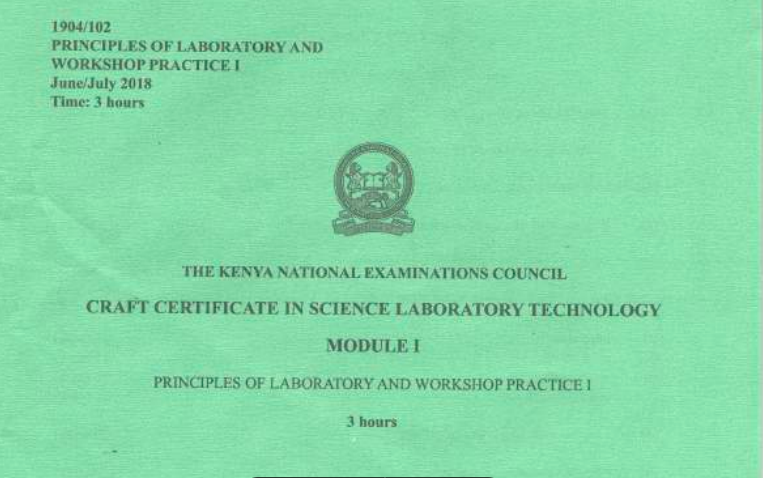This course is designed to provide advanced knowledge and skills to students who are seeking to train as chemistry professionals and scientists in the areas of manufacturing and research. The programme provides students with comprehensive theoretical learning, as well as real life situations, so that they can build the attitudes, skills, and experiences that will prepare them to meet the challenges within this growing field.
Diploma in science laboratory technology module 1 units
Principle Of Laboratory and Workshop Practices
Physical Techniques
ICT, Mathematics and Entrepreneurship
Chemistry Techniques
Biology Techniques
Diploma in science laboratory technology module 2 units
Science Laboratory Techniques II (Practical)
Principles of Laboratory and Workshop Practice II
Physics Techniques II
Communication
Chemistry Techniques II
Biology Techniques II
Diploma in science laboratory technology module 3 units
- Laboratory Practices
Benefits of KNEC past papers
- It improves learners knowledge
- Helps you understand the units taught
- Gives the learners insight on what kind of questions to expect
- Prepares learners for their main end of course exam.
- Helps trainers in creating assessment tools
- Supplements learner’s education.
- Helps in group discussion
Diploma in science laboratory technology module 2 KNEC past papers
Science Laboratory Techniques II (Practical) KNEC past papers
Principles of Laboratory and Workshop Practice II KNEC past papers
Physics Techniques II KNEC past papers
Communication KNEC past papers
Chemistry Techniques II KNEC past papers
Biology Techniques II KNEC past papers
MORE KNEC PAST PAPERS:
- Diploma in ICT module 2 KNEC past papers Free download
- Diploma in ICT module 3 KNEC past papers Free download
- Certificate in ICT module 1 KNEC past papers Free download
- Certificate in ICT module 2 KNEC past papers Free download
- Diploma in Electrical and electronic engineering module 1 KNEC past papers Free download
- Diploma in electrical and electronic engineering module 2 KNEC past papers Free download
- Diploma in Human resource management module 1 KNEC past papers Free download
- Diploma in human resource management module 2 KNEC past papers Free download
- Craft in supply chain management module 1 KNEC past papers Free download
- Certificate in electrical and electronic engineering module 1 KNEC PAST PAPERS
- Certificate in electrical and electronic engineering module 2 KNEC PAST PAPERS
- Craft in supply chain management module 1 KNEC PAST PAPERS
- Diploma in building technology module 1 KNEC PAST papers
- Diploma in building and technology module 2 KNEC past papers
- Diploma in building and technology module 3 KNEC past papers
- Diploma in civil engineering module 1 KNEC PAST PAPERS
- Diploma in civil engineering module 2 KNEC PAST PAPERS
- Diploma in civil engineering module 3 KNEC PAST PAPERS
- Craft in supply chain management module 2 KNEC PAST PAPERS
- Diploma in Quantity survey KNEC past papers
- Certificate in plumbing module 1 KNEC past papers
- Certificate in building and technology module 1 KNEC past papers
- Certificate in building and technology module 2 KNEC past papers
- Diploma in social work and community development module 1 KNEC past papers
- Diploma in social work and community development module 2 KNEC past papers
- Diploma in social work and community development module 3 KNEC past papers
- Diploma in electrical and electronic engineering module 3 KNEC past papers
- Diploma in Human resource management module 3 KNEC past papers
- Diploma in supply chain management module 3 KNEC past papers
- Diploma in supply chain management module 1 KNEC past papers
- Certificate in human resource management module 2 KNEC past papers
- Diploma in supply chain management module 2 KNEC past papers
- Certificate in human resource management module 1 KNEC past papers
- Certificate in food and beverage module 1 KNEC past papers
- Certificate in food and beverage module 2 KNEC past papers
- Diploma in catering and accommodation module 1 KNEC past papers
- Diploma in catering and accommodation module 2 KNEC past papers
- Diploma in catering and accommodation module 3 KNEC past papers
- Diploma in food and beverage module 1 KNEC past papers
- Diploma in food and beverage module 2 KNEC past papers
- Diploma in food and beverage module 3 KNEC past papers
- Diploma in tourism management module 1 KNEC past papers
- Diploma in tourism management module 2 KNEC past papers
- Diploma in tourism management module 3 KNEC past papers
- Certificate in tour guiding and travel operations module 1 KNEC past papers
- Certificate in tour guiding and travel operations module 2 KNEC past papers
- Diploma in business management module 1 KNEC past papers
- Diploma in business management module 2 KNEC past papers
- Diploma in business management module 3 KNEC past papers
- Diploma in sales and marketing module 1 KNEC past papers
- Diploma in sales and marketing module 2 KNEC past papers
- Diploma in sales and marketing module 3 KNEC past papers
- Certificate in business management module 1 KNEC past papers
- Certificate in business management module 2 KNEC past papers
- Certificate in project management module 1 KNEC past papers
- Certificate in project management module 2 KNEC past papers
- Certificate in sales and marketing module 1 KNEC past papers
- Diploma in agriculture module 1 KNEC past papers
- Diploma in agriculture module 2 KNEC past papers
- Diploma in agriculture module 3 KNEC past papers
- Diploma in early childhood development KNEC past papers
- Certificate in early childhood development and education KNEC past papers
- Artisan certificate in welding and fabrication KNEC past papers
- Artisan certificate in plumbing KNEC past papers
- Artisan certificate in painting and decorating KNEC past papers
- Artisan in leatherwork technology KNEC past papers
- Artisan certificate in motor vehicle mechanics KNEC past papers
- Artisan certificate in masonry KNEC past papers
- Artisan certificate in General agriculture KNEC past papers
- Artisan certificate in general fitter KNEC past papers
- Artisan certificate in garment making KNEC past papers
- Artisan certificate in electrical installation KNEC past papers

